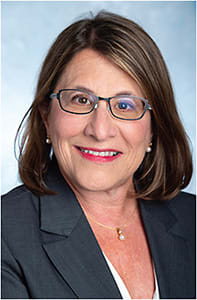
Marian Macsai, MD, serves as chief medical officer for Oyster Point Pharma in Princeton, N.J., and is a clinical professor of ophthalmology at University of Chicago Pritzker School of Medicine. Dr. Macsai most recently served as chief of the division of ophthalmology for NorthShore University Health System.
Ophthalmology Management: Can you discuss your role as chief medical officer of Oyster Point Pharma and how you got started in this role?
Dr. Marian Macsai: As chief medical officer, my role is to oversee all medical activities regarding drug development, clinical trials, medical affairs and pharmacovigilance. Prior to working at Oyster Point Pharma, I was chief of the division of ophthalmology at NorthShore University HealthSystem.
As an ophthalmologist, my one-on-one interactions with patients brought me such joy, but when the pandemic began and I was limited in time and space to see patients, I began to explore different opportunities. While a number of opportunities came my way, I chose the opportunity at Oyster Point Pharma and feel very grateful because the people I work with are so dedicated to the science and transforming the way we treat diseases of the front of the eye. As a group, Oyster Point is a fun, smart and dedicated group of people working toward the same goal: helping patients. This was an opportunity I couldn’t pass up.
OM: Why did you move in this direction with your career?
MM: I began to assess what the next phase of my career would be during the pandemic. I felt that the type of care that I would be able to provide to my patients would be different, and telehealth did not lend itself as well to ophthalmology as it did for other fields of medicine.
I knew that moving forward, I wanted to apply my medical insights about the human eye to help patients. With drug development, I felt that I would have the opportunity to both affect change and to potentially make an impact on a larger patient population. The opportunity at Oyster Point Pharma also allowed me to use my skill sets in a new and different way — using leadership skills, basic science skills and clinical trial skills.
OM: What are some of the latest developments at Oyster Point Pharma?
MM: We recently celebrated the one-year anniversary of Tyrvaya, the first and only FDA-approved nasal spray for the treatment of signs and symptoms of dry eye disease (DED). For as long as I can remember, and prior to the launch of Tyrvaya, prescription treatments for DED have been limited to some form of eyedrop; we were long overdue for some inspired innovation.
I’m also very excited about our pipeline programs, particularly Oyster Point Pharma’s proprietary, investigational Enriched Tear Film Gene Therapy platform. By delivering target genes into the lacrimal gland, via non-replicating DNA delivery transporters, the mRNA is believed to create a “blueprint” for bio-activating a multitude of therapeutic proteins in the tear film. Paired with our other investigational therapy, OC-01 nasal spray, we believe that therapeutic levels can be modulated to potentially produce a further, significant increase in the target molecule in tear film. This approach has the potential to change the way that chronic diseases of the ocular surface are treated, as well as to potentially address issues related to patient compliance with therapy. OM








